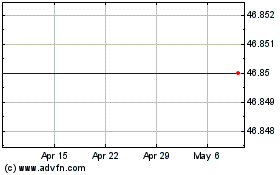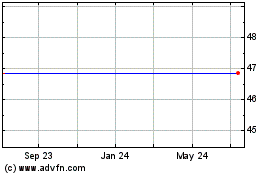China Wants More Private Money for Its State-Owned Energy Giants -- Update
May 22 2017 - 8:11AM
Dow Jones News
By Brian Spegele
BEIJING--Seeking to build national champions to rival the likes
of Exxon Mobil Corp., China is moving to boost private investment
in its vast oil companies--and may be willing to slash their
workforces in the process.
China's oil and gas sector has been struggling under a
combination of low energy prices and a weaker economy, sapping the
sales and profit of its state-owned energy giants.
A new policy road map, unveiled late Sunday and backed by the
Communist Party's Central Committee and the government's cabinet,
indicated leaders are considering more aggressive action to make
state-owned companies operate more like global peers.
Market forces "should play a decisive role in resource
allocation," the official Xinhua News Agency quoted the reform plan
as saying.
The government offered eight general targets, including better
managing oil imports and exports, upgrading refineries and boosting
reserves. Details are expected in the coming months, said Lin
Boqiang, who researches energy policy at Xiamen University in
southeast Fujian province.
According to Xinhua's account, the newly released plan pledges
to solve "problems left over from history" and allow state-owned
oil-and-gas companies "to lose weight and be fit"-- suggesting job
reductions, Mr. Lin said.
Cutting oil-sector jobs, whether through layoffs, restructuring
or attrition, would mark a change for China's government, which has
hesitated to do that for fear of social instability.
PetroChina Co., the listed arm of China National Petroleum
Corp., employs around 500,000 people--about seven times as many as
Exxon, despite reporting similar revenue in 2016.
"It's the first time they talked about allowing the oil
companies to really cut their force," Mr. Lin said of the
government's plan.
The oil sector was an early target of an anticorruption drive
led by President Xi Jinping, which significantly reduced the
political clout of state oil giants such as PetroChina Co. and
China Petroleum and Chemical Corp. It diminished their ability to
resist opening the industry to more competition.
Changes since Mr. Xi took over include allowing privately owned
refiners to import crude oil directly, a break with the past that
brought them into tighter competition with state-owned companies.
That shift has rippled world-wide as foreign oil suppliers and
trading houses from Russia to Europe lined up to do business with
the new customers.
Under the newly released plan, the government also said it is
committed to carrying out more "mixed-ownership reform" sectorwide.
The government has been experimenting for several years with
letting more outside investors take minority stakes in parts of
state-owned industry. In one early example, China Petroleum and
Chemical, known as Sinopec, sold off a nearly 30% stake in its
gas-stations unit in 2014.
Yet the private stakes have generally been small, and Gordon
Kwan, an oil and gas analyst at Nomura Holdings Inc., says it is
too early to know whether the openings are enough to achieve the
goal of boosting efficiency in the sector. Nevertheless, he said
the plan sent a positive signal to investors about the government's
intent.
"We can only evaluate this 10 years from now," he said. "It's
not going to be an overnight success."
Write to Brian Spegele at brian.spegele@wsj.com
(END) Dow Jones Newswires
May 22, 2017 07:56 ET (11:56 GMT)
Copyright (c) 2017 Dow Jones & Company, Inc.
Petrochina (NYSE:PTR)
Historical Stock Chart
From Mar 2024 to Apr 2024

Petrochina (NYSE:PTR)
Historical Stock Chart
From Apr 2023 to Apr 2024
